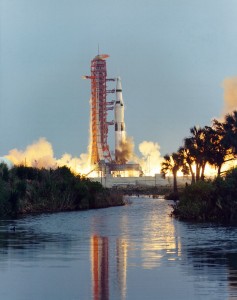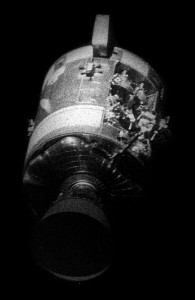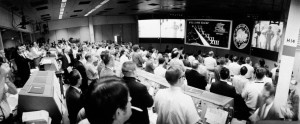
Forty five years ago, astronaut Jack Lousma was acting as the ground-based Capcom (a shorthand for Capsule communicator) for the Apollo 13 mission, which was in its coast phase towards the Moon.
The mission so far had been routine. Lunar missions seemed to have become almost straightforward. Lousma asked the crew, as part of normal operations:
13, we’ve got one more item for you, when you get a chance. We’d like you to stir up your cryo tanks.
The response – initially from Command Module pilot Jack Swigert has become a modern legend:
Okay, Houston —I believe we’ve had a problem here.
There had been an explosion. The crew’s first thoughts were that a meteor might have struck the Lunar Module. In fact, an oxygen tank had exploded because of an old wiring issue inside the tank. The following image – taken in the last minutes of the flight – shows the immense damage done to the Service Module.

What followed is equally well known – a story of resilience, ingenuity, guts and adaptability. The main Command and Service Module Odyssey would be powered down, and the Lunar ModuleAquarius would become an unexpected lifeboat, supporting the full crew way beyond its original design limits. The moon was lost. The rest of the mission would now have a life and death focus on managing resources and controlling the spacecraft’s trajectory. The unfolding events would grab the world’s attention in a way that was unprecedented – billions of people would care, and sometimes pray, for the Apollo 13 crew during their encounter with fate.
Cutting to the present day, It was my privilege to attend a Forty-Fifth anniversary celebration of the mission at Cape Canaveral last Saturday. The highlight was a panel discussion with the surviving astronauts (Jim Lovell, and Fred Haise), mission directors (Gene Kranz, Glynn Lunney, Gerry Griffin) and the Capcom team (Vance Brand, Jack Lousma and Joe Kerwin). The discussion was both entertaining and hugely inspiring. We sat in front of real history.
Again it struck me again how perfect Apollo 13 is as a modern parable: a parable of leadership; of how to take action in a moment of complex crisis; of teamwork, and of engineering excellence. I have often used it in my own thinking, and teaching.
In no particular order, here are just some of the lessons Apollo 13 can teach us.
The Power of Teamwork. The film Apollo 13 centres on Jim Lovell and Gene Kranz. It has to, in order to present a complex real-life drama with the confines of the movie format.
But it was not for nothing that the panel at the celebration event consisted of multiple astronauts and flight directors. And every member of that panel emphasised the importance of teamwork, and how they themselves represented the efforts of 1000s.
Indeed, before cell phones and modern communications, without asking and within a short period after the incident, Houston Mission Control and many other NASA centres were filled with NASA members and supporting contractors. People would be at their desks for days, dividing up an immensely complex problem into solvable pieces. NASA and its suppliers pulled together to save the three astronauts as they swung around the moon.
The Power of Responsible Leadership in a Crisis. One of the key moments for the flight directors managing the crisis occurred when they – represented by Glynn Lunney and Gerry Griffin – went to brief NASA leadership, who would themselves have been under a great deal of hard-edged public pressure. The flight directors went through five complex recovery scenarios, and made their recommendation out of that five.
Given the importance of the decisions being made, the Flight Directors were ready for challenge. The challenge that came delighted them
We have just one question. How can we help?
Those of you who have worked in major problem resolution and crisis management will recognise the importance of this. As a leader, if you have the best people, and good procedures, then your role is to let them act, and give them the resources and support they need.
The Power of Professionalism. The crew of the mission, and the people that supported them, had been selected on the basis of character and ability. They had been well trained. As Ron Howard, director of the film Apollo 13, once pointed out to Jim Lovell , it was hard to hear a problem when listening to the original tapes from the time of the initial explosion. The response to immense problems was calm and measured – in both the spacecraft and in Mission Control. It was focused on making revised plans, and working those plans. In fact throughout the crisis, there was little doubt and little fear. The NASA team believed it could save the astronauts, and worked carefully to that goal.
The Power of Preparation, Rehearsal and Testing. Although the Apollo 13 was an extreme incident, NASA’s careful preparation paid off. They had rehearsed using the lunar module to control the full “stack” on Apollo 9. NASA’s detailed, existing procedures proved to be highly adaptable to the new set of problems. The wiring on the Command and Service Module was made to an extraordinarily high standard – a reaction to the tragedy of the Apollo 1 fire. That meant that the dampness inside the hibernating spacecraft did not create issues when it was brought back to life for re-entry.
So, after forty-five years, the story of Apollo 13 – of NASA’s successful failure – still endures, and inspires. Above all, it can teach.

Keith Haviland
Keith Haviland is a film producer and founder of Haviland Digital Limited – dedicated to intelligent content across film, TV and other media. He is one of the producers of the award-winning Last Man on the Moon. He has been a business and technology leader, with a special focus on how to combine big vision and practical execution at the very largest scale, and how new technologies will reshape all that we do. He is a Former Partner and Global Senior Managing Director at Accenture, and founder of Accenture’s Global Delivery Network.
